The nightmare before Christmas: Gaza’s Christians await permits to see loved ones at mercy of Israeli authorities
On Christmas Eve, Christians in Gaza steel themselves for a holiday separated from children and relatives in the West Bank
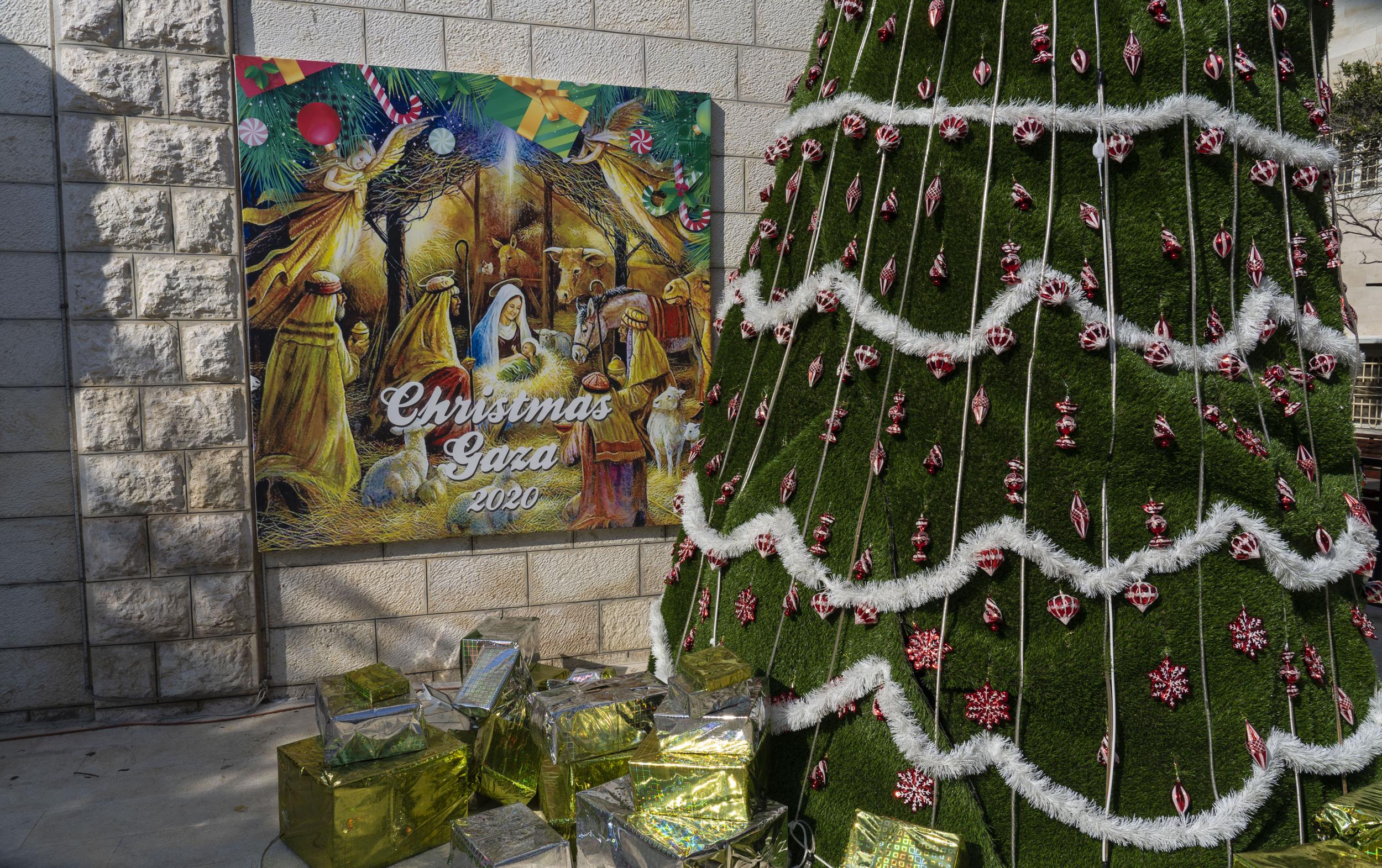
Your support helps us to tell the story
From reproductive rights to climate change to Big Tech, The Independent is on the ground when the story is developing. Whether it's investigating the financials of Elon Musk's pro-Trump PAC or producing our latest documentary, 'The A Word', which shines a light on the American women fighting for reproductive rights, we know how important it is to parse out the facts from the messaging.
At such a critical moment in US history, we need reporters on the ground. Your donation allows us to keep sending journalists to speak to both sides of the story.
The Independent is trusted by Americans across the entire political spectrum. And unlike many other quality news outlets, we choose not to lock Americans out of our reporting and analysis with paywalls. We believe quality journalism should be available to everyone, paid for by those who can afford it.
Your support makes all the difference.Sitting in the shadow of the Christmas tree by Gaza’s only Catholic church, Diana, a mother-of-three, waits for news of whether or not Israel will allow her to see her children.
She has been separated from her son Jawdat for four years. He moved to the occupied West Bank to find work, as youth unemployment in Gaza soared to 70 per cent.
Diana has not seen her youngest daughter Sara since she began studying in Jordan two years ago.
In fact, for the last three years, Diana herself has been barred from crossing into Israel for regular cancer remission check-ups.
Her eldest daughter, Elaine, 19, who sits beside her fiddling with a crucifix necklace, is also waiting. She is engaged to a Christian man, who lives in the West Bank.
The young couple met online in 2018 but have only seen each other in the flesh once, in Jordan, when Elaine was allowed to attend a girl’s scouts event.
Christmas and Easter are the few times a year Gaza’s dwindling Christian population can apply for permits to leave the 35-mile long enclave.
The special permissions are supposed to allow the 1,000 or so of Gaza’s Christians to worship in Bethlehem or Jerusalem, to see family in other parts of the occupied Palestinian Territories, or to briefly travel abroad.
But the overwhelming majority of families are never granted the papers to cross.
Mid interview, one of the church officials breaks the news that only 192 of the 950 permits submitted have been approved. Diana and her daughter were not among the lucky few.
“I’m 45 years old but my heart feels 90,” says the breast cancer survivor, struggling to put on a brave face.
“Our family is separated because of the occupation, but what did we do to deserve this?”
She adds: “They always say security reasons. But we’re Christians. We don’t have weapons we don’t have any ties to any armed group.”
Elaine, downcast, says she fears she will never be able to marry.
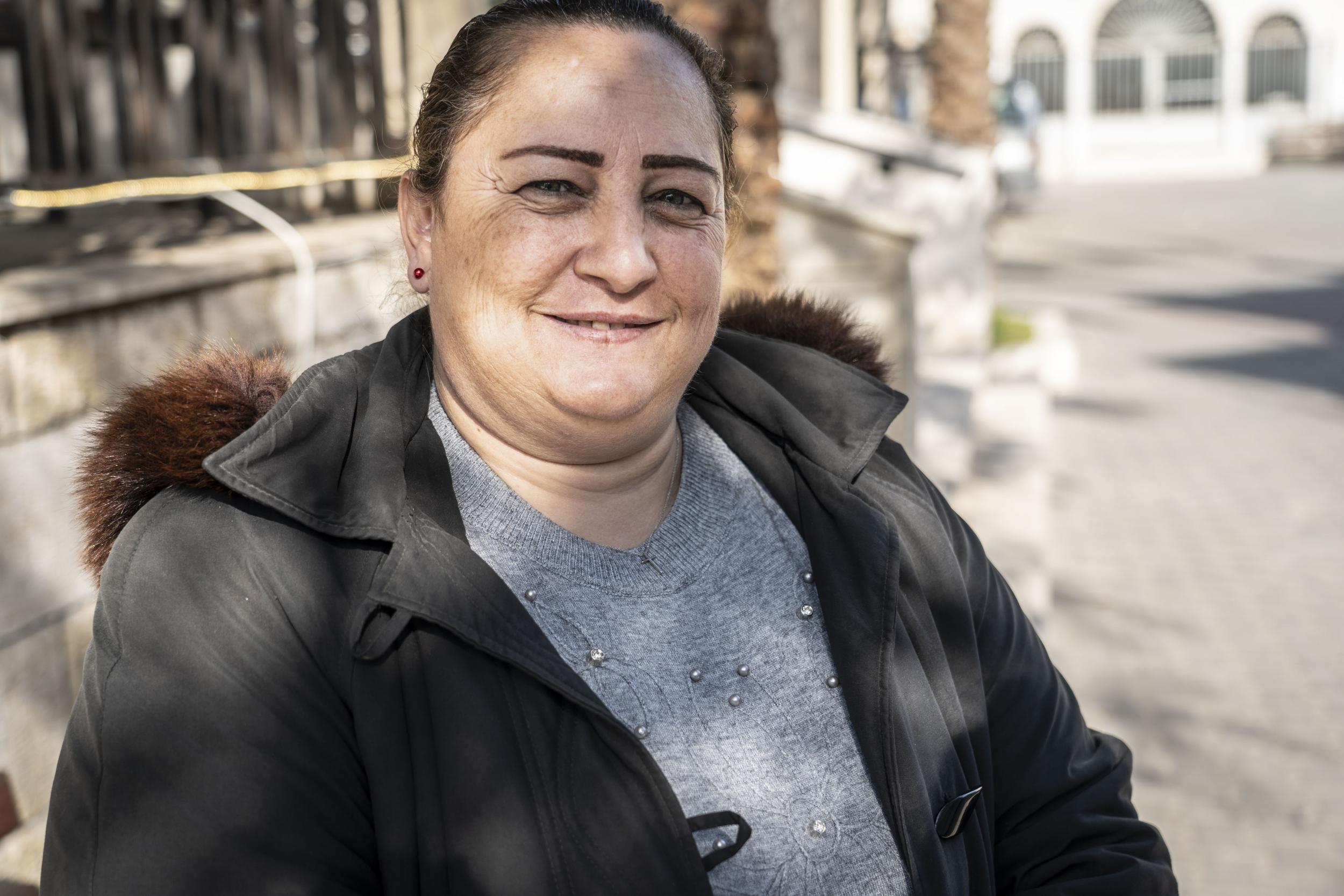
“I feel awful all the time my fiance and I can’t share moments together,” she says. “I just want to live with him. All we do is dream of permits.”
Gaza has been closed off to the world since Israel and Egypt shuttered the borders after Hamas violently seized control of the Strip in 2007.
It is geographically separated from the West Bank, where Bethlehem is, and so crossing from one area to the other requires hard-to-get permission from the Israelis, who accuse Hamas of abusing the permit system to plan attacks against its citizens.
This year, the Israeli authorities have flip-flopped on the Christmas permits so much so that Christians told The Independent they felt like yo-yos.
The Coordinator of Government Activities in the Territories (Cogat), the body that deals with the permissions, originally said in early December they would grant no holiday permits.
At the weekend, 192 permissions were suddenly issued. However, families said many of them were random: a husband was approved but not the wife, or the children were approved but without the parents.
Cogat then announced on Facebook late on Sunday it would consider all permits, pending security assessments “in recognition of the Christmas holiday”, but gave no further information.
Diana is still not hopeful.
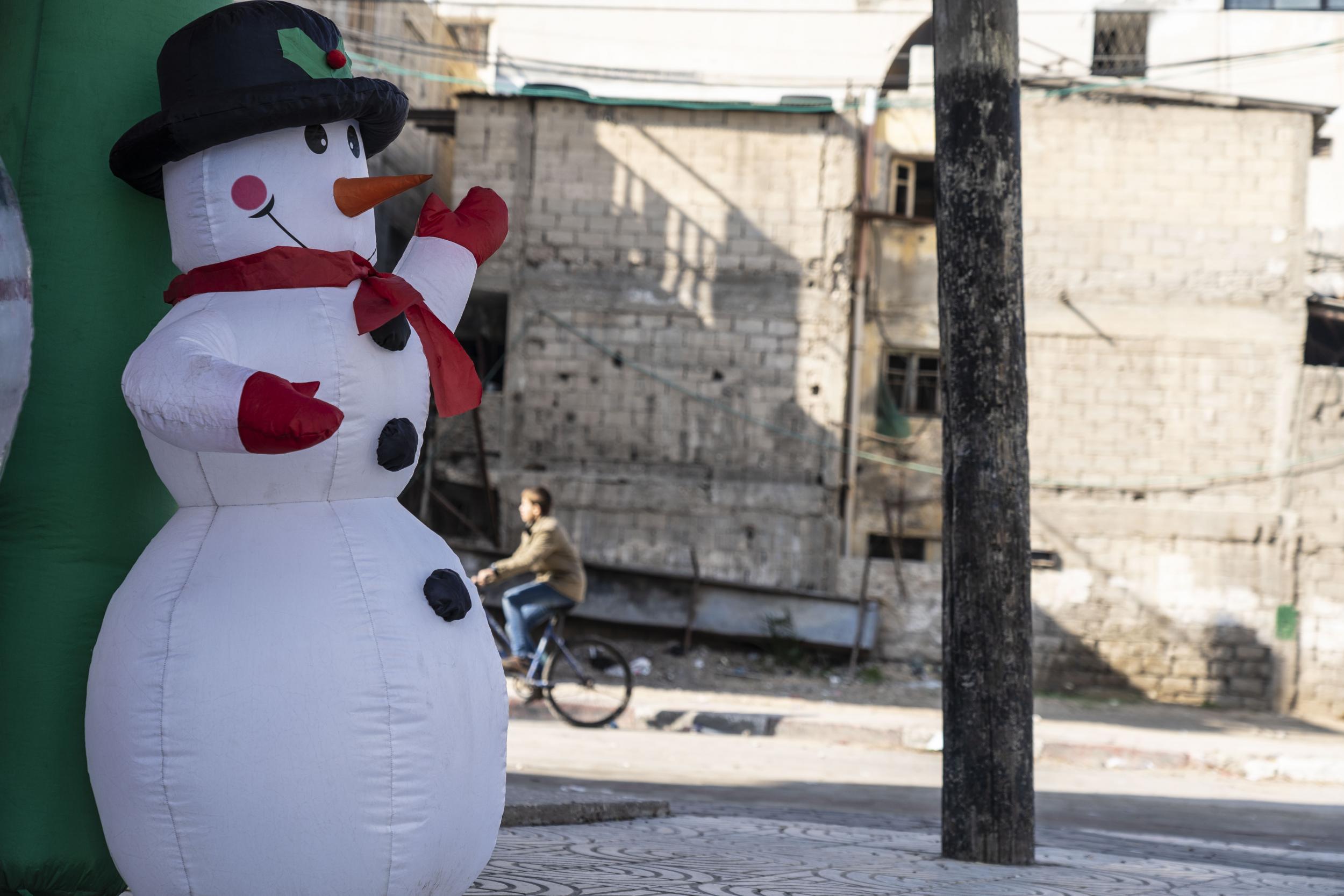
“It feels like collective punishment. And it’s so random. Young children, sometimes babies, get permission but their mothers don’t,” she adds.
Israeli rights groups say over the last few years it has become increasingly hard for all Gazans, whether Muslim or Christian, to secure permission to leave the Strip. They say this is a deliberate move by the Israeli authorities to divide the Palestinian territories, thereby decreasing the chance of a future independent state.
Miriam Marmur who works for Gisha, an Israeli NGO working on Palestinian freedom of movement, says this year the Israeli authorities have been particularly last minute with the Christmas papers, calling it “confusion by design”.
“As we’ve seen recently, Israel is increasingly cracking down on movement between Gaza and West Bank as part of a policy of separation. The goals are political in nature,” she tells The Independent.
“Israel is trying to minimise movement and freedoms using bureaucratic violence.”
Cogat also tried to ban permits at Easter but eventually granted 300, Marmur continues.
“It is definitely getting worse each year,” she adds.
Back in Gaza, the church authorities are struggling to boost morale.
“Christmas means Bethlehem like Easter means Jerusalem and there are so many families separated between Gaza and the West Bank. The feeling here is one of sadness,” says Father Gabriel Romanelli, from Brazil, who is the parish priest of Gaza’s Catholic church.
15 years ago, there were 3,500 Christians in Gaza, now there are barely 1,000 left. We fear they will all leave
“We pray for peace and justice. We are trying to plan the church service on Christmas Day and funs things like bingo,” he adds.
He says that the increasingly tough conditions in Gaza have sparked an exodus of young Christians.
“Fifteen years ago, there were 3,500 Christians in Gaza, now there are barely 1,000 left,” he says. “We fear they will all leave.”
Mina (not his real name), a young Christian youth activist from Gaza, left for the West Bank town of Jericho last Christmas.
Like many young Gazan Christians, he used a temporary Christmas permit to leave Gaza for good.
“I didn’t want to leave Gaza, I had no choice with the lack of work and life opportunities,” he explains.
“The Israelis consider me to be illegally staying in the West Bank since my permit requires me to go home, but how else am I supposed to live?”
It is tough to be Christian in Gaza, which is largely controlled by Islamist groups like Hamas and Palestinian Islamic Jihad.
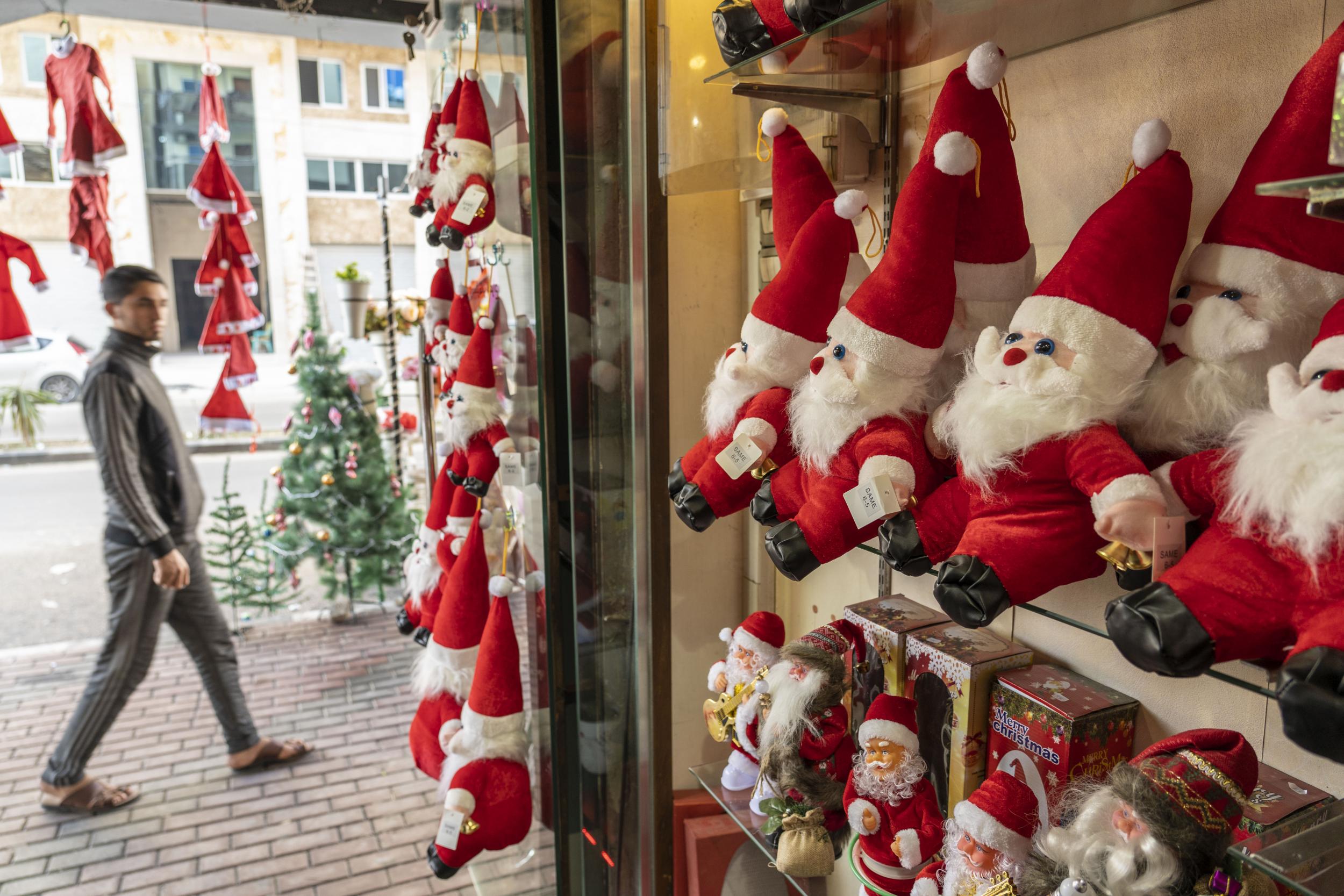
Although Christians in Gaza do not face persecution as communities do in countries like Egypt, openly practising Christianity can be a taboo in Gaza’s conservative society.
One Christian girl, who asked to remain anonymous, spoke of harassment from Muslim youth for wearing a crucifix or not covering her hair with a hijab, the Islamic headscarf.
Hanna Maher, 40, who works for Gaza’s Baptist church, says it is hard to secure work or political positions with the Hamas-dominated authorities, while options of marriage are minimal.
“The situation for all Gazans is tough, but as a minority it can be trickier,” he adds.
At Gaza’s Orthodox church, weathered photos plaster the wall of Santa parades and Christmas scout performances in central Gaza in 1998, which would not be possible now.
Older Christian residents recall days where they would erect Christmas trees in Gaza City’s main square.
On Christmas Eve, they would jump in the car and complete the hour-and-a-half drive to Bethlehem for mass.
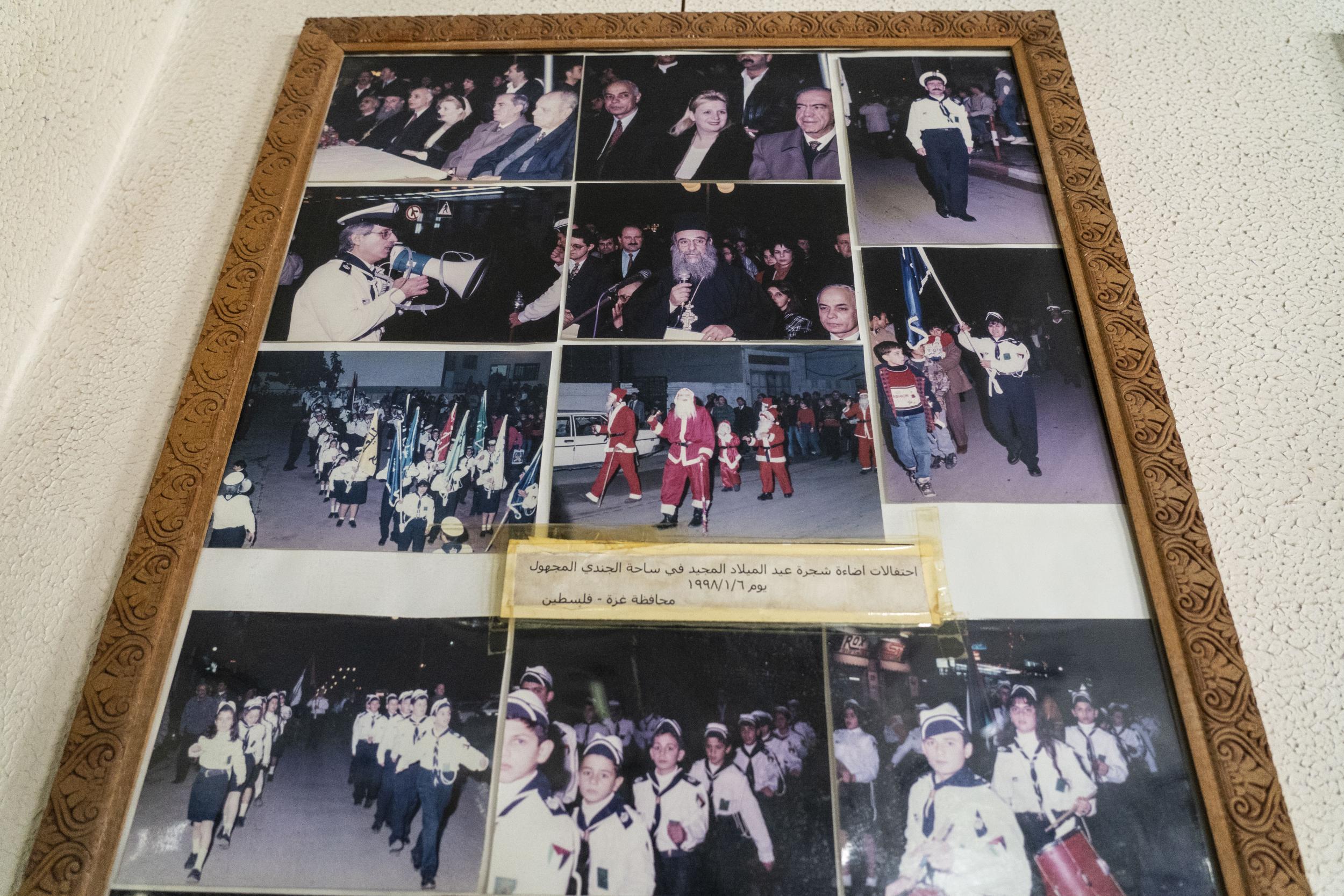
These are all memories of the past.
“My wife hasn’t received a permit in six years, she has family in Bethlehem,” says Kaamil Ayat, a spokesman for the Orthodox church.
“Now the permit situation is worse than it has ever been in terms of the numbers granted and the delay. We genuinely don’t know why.”
Join our commenting forum
Join thought-provoking conversations, follow other Independent readers and see their replies
Comments